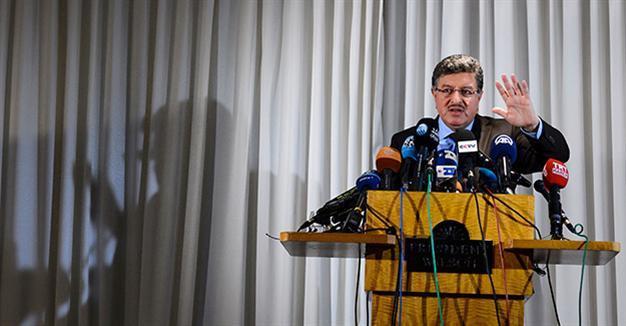Syrian opposition to meet UN envoy over humanitarian demands
GENEVA

High Negotiations Committee (HNC) spokesman Salem al-Meslet gestures during a press conference during Syria peace talks in Geneva on January 31, 2016. AFP Photo
Members of the main Syrian opposition group said Feb. 1 that they plan to give U.N. Special Envoy on Syria Staffan de Mistura a “roadmap” for implementation of their humanitarian demands on Syria that they say must happen before they formally join indirect peace talks with a government delegation in Geneva.
Farah Atassi, a member of the Saudi-backed opposition coalition known as the High Negotiations Committee (HNC), said the top priority should be to stop the “unprecedented bombardment by the Syrian regime” of rebel-held suburbs of the Syrian capital Damascus, according to the Associated Press.
The group was to meet with De Mistura at U.N. offices in Geneva later on Feb. 1, his spokeswoman, Khawla Mattar, said indirect talks between the two sides were unlikely before Feb. 2.
De Mistura rescheduled a planned meeting with the government delegation in the morning of Feb. 1, because he wanted to hold an official meeting with the opposition before launching indirect talks.
“We have come to Geneva to seek relief for our people by insisting U.N. Security Council resolution 2254 is implemented, which means humanitarian relief, the lifting of sieges, and the end of attacks on civilians,” spokesman Salem al-Mislet said in a statement.
The HNC, which only reluctantly showed up late Jan. 31 and held informal talks with de Mistura on the same day in a Geneva hotel, is hesitating about entering formal indirect talks envisioned under a November roadmap agreed by outside powers.
On the same day, Saudi Foreign Minister Adel al-Jubeir and his Turkish counterpart Mevlüt Çavuşoğlu voiced support for the HNC.
“We share the same position which consists of supporting our Syrian brothers directly or when they take part in international meetings,” Jubeir said in Riyadh at a joint news conference with Çavuşoğlu on Jan. 31, according to AFP.
Turkey’s top diplomat echoed him, saying: “We back demands for a truce and for sending humanitarian aid” to besieged towns in Syria as requested by the opposition.
Çavuşoğlu also said that the Syrian opposition was free to leave peace talks in Geneva if its terms were not met.
“We asked the opposition that they can put their conditions to start the negotiations and continue the negotiations. They can leave anytime if they are not implemented,” Çavuşoğlu was quoted as saying by Reuters.
Meanwhile, the United Nations human rights chief Zeid Ra’ad al-Hussein on Feb. 1 said that no amnesty should be possible for people suspected of committing war crimes or crimes against humanity, as Geneva hosted troubled talks aimed at ending Syria’s war.
“We do have a principled position in the United Nations that no amnesties should be considered for those suspected of having committed crimes against humanity or war crimes,” al-Hussein told reporters in Geneva.
Zeid said the talks must go forward and secure a swift end to the violence.
“Naturally after five years of this most gruesome spectacle of seeing the Syrian public subjected to public executions we hope and pray that the talks being mediated by de Mistura will lead to the end of all of these horrific abuses, human rights abuses, violations of international humanitarian law,” he said.
